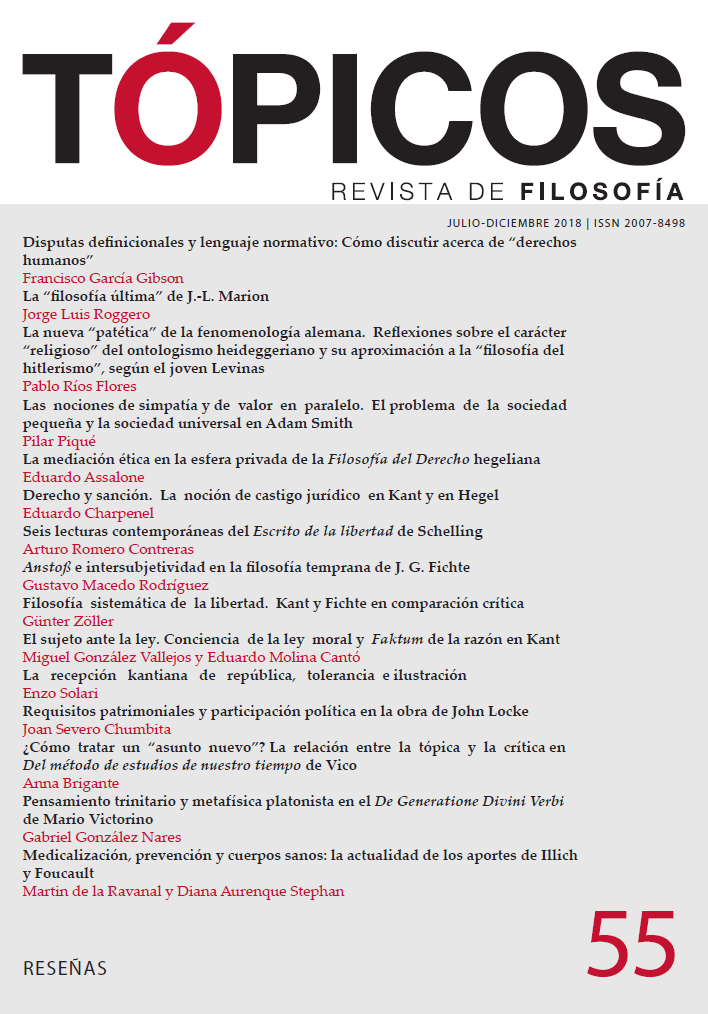Publicado 2018-06-08
Palabras clave
- Kant,
- imperativo categórico,
- factum de la razón
Cómo citar
Resumen
En este trabajo analizaré dos aspectos relativos a lo que Kant considera el principio fundamental de la razón práctica. En primer lugar, intentaré mostrar que el principio práctico fundamental implica necesariamente una suerte de suspensión de todo principio subjetivo de acción, esto es, de la función orientadora propia de las máximas. Este sería un primer momento de negatividad inherente a la conciencia de la ley moral en nosotros. En segundo lugar, trataré también de mostrar que la conciencia de dicha ley implica el reconocimiento de nuestra inadecuación originaria respecto de ella, y que dicha inadecuación es sentida necesariamente como un peculiar tipo de dolor, sentimiento negativo tan único y originario como es único y originario el hecho de la conciencia de la ley. Este sería un segundo momento de negatividad, relativo esta vez a la propia identidad práctica del agente.
Descargas
Referencias
- Bibliografía
- Ameriks, K. (2003). Interpreting Kant’s Critiques. Oxford: Clarendon Press.
- Ameriks, K. (2013). “Is Practical Justification in Kant Ultimately Dogmatic?”, en: Mark Timmons and Sorin Baiasu (eds.), Kant on Practical Justification. Oxford: Oxford University Press, 2013, 153-175.
- Henrich, D. (1973). “Der Begriff der sittlichen Einsicht und Kants Lehre vom Faktum der Vernunft”, en: G. Prauss (ed.), Kant. Zur Deutung seiner Theorie von Erkennen und Handeln, Kiepenheuer & Witsch, Köln, 1973, pp. 223-254.
- Kant, I. (1900). Gesammelte Schriften. Hrsg.: Bd. 1-22 Preussische Akademie der Wissenschaften, Bd. 23 Deutsche Akademie der Wissenschaften zu Berlin, ab Bd. 24 Akademie der Wissenschaften zu Göttingen. Berlin 1900 ss.
- Kant, I. (1992). Crítica de la facultad de juzgar. Trad. de P. Oyarzún. Caracas: Monte Ávila, 1992.
- Kant, I. (2000). Crítica de la razón práctica. Trad. de Roberto Rodríguez Aramayo. Madrid: Alianza.
- Kant, I. (2009). Crítica de la razón pura. 2ª ed. Trad. de Mario Caimi. Buenos Aires: Colihue.
- Kleingeld, P. (2010). “Moral consciousness and the ‘fact of reason’”, en: A. Reath & J. Timmermann (eds.), Kant's Critique of Practical Reason: A Critical Guide. Cambridge: Cambridge University Press, 2010, pp. 55-72.
- Korsgaard, C. (2009). Self-Constitution. Oxford: OUP.
- Korsgaard, C. (1996). The Sources of Normativity. Cambridge: Cambridge University Press.
- Korsgaard, C. (1996): Creating the Kingdom of ends, Cambridge 1996.
- O´Neill, O. (2002). “Autonomy and the Fact of Reason in the Kritik der praktischen Vernunft, 30–41,” en: O. Höffe (ed.), Immanuel Kant, Kritik der praktischen Vernunft. Berlin: Akademie Verlag, pp. 81–97.
- Schönecker, D. (2013a). “Das gefühlte Faktum der Vernunft. Skizze einer Interpretation und Verteidigung”. Deutsche Zeitschrift für Philosophie, 61/1 (2013): 91-107.
- Schönecker, D. (2013b). “Kant’s Moral Intuitionism: The Fact of Reason and Moral Predispositions”, Kant Studies Online (2013): 1-38.
- Sussman, D. (2008). “From Deduction to Deed: Kant’s Grounding of the Moral Law”. Kantian Review, 13 (1), pp. 52-81.
- Willaschek, M. (1991). “Die Tat der Vernunft. Zur Bedeutung der Kantischen These vom ‘Faktum der Vernunft’”, en: G. Funke (ed.), Akten des Siebten Internationalen Kant-Kongresses. Bonn: Bouvier, pp. 455-466.
- Wolff, M. (2009). “Warum das Faktum der Vernunft ein Faktum ist. Auflösung einiger Verständnisschwierigkeiten in Kants Grundlegung der Moral”. Deutsche Zeitschrift für Philosophie, 57 (4), pp. 511–549.






